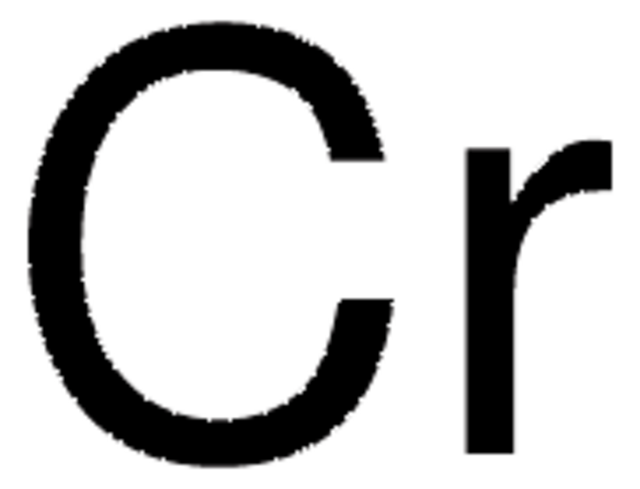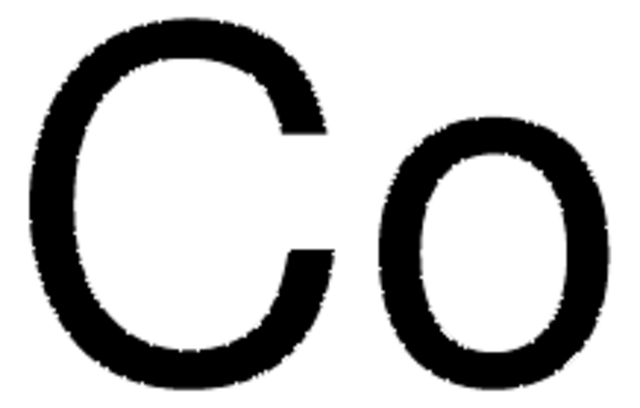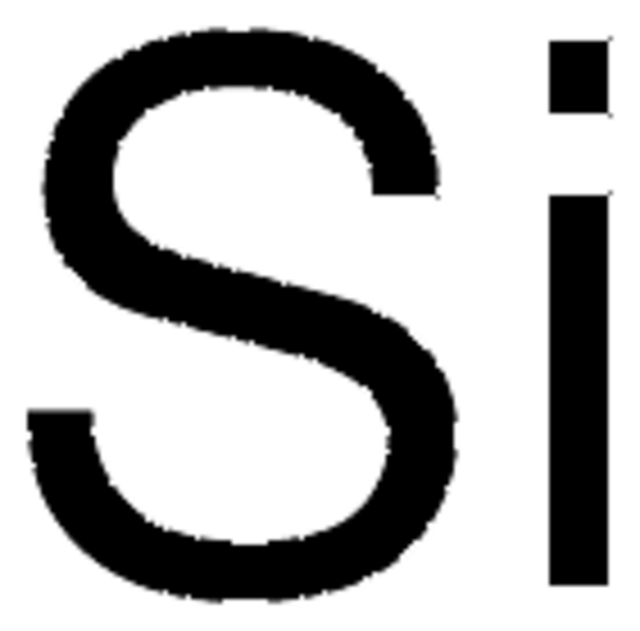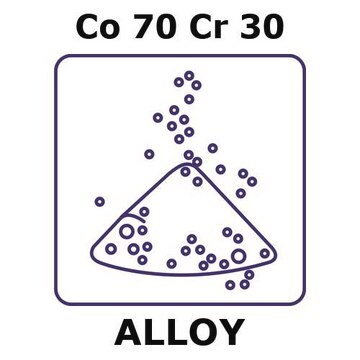266299
Chromium
powder, ≥99% trace metals basis, <45 μm
Sinónimos:
Cd
Iniciar sesiónpara Ver la Fijación de precios por contrato y de la organización
About This Item
Fórmula empírica (notación de Hill):
Cr
Número de CAS:
Peso molecular:
52.00
Número CE:
Número MDL:
Código UNSPSC:
12161600
ID de la sustancia en PubChem:
NACRES:
NA.22
Productos recomendados
Nivel de calidad
Análisis
≥99% trace metals basis
formulario
powder
idoneidad de la reacción
core: chromium
reagent type: catalyst
resistividad
12.7 μΩ-cm, 20°C
tamaño de partícula
<45 μm
bp
2672 °C (lit.)
mp
1857 °C (lit.)
densidad
7.14 g/mL at 25 °C (lit.)
cadena SMILES
[Cr]
InChI
1S/Cr
Clave InChI
VYZAMTAEIAYCRO-UHFFFAOYSA-N
¿Está buscando productos similares? Visita Guía de comparación de productos
Descripción general
Chromium is widely used as a catalyst in chemical synthesis. It is also used in the preparation of other chromium-based compounds.
Aplicación
Chromium (Cr) powder can be used in the preparation of Cr-based nanoporous metal-organic frameworks in activated carbon. This composite is used as an adsorbent for the removal of contaminants of emerging concern (CECs) from water.
Código de clase de almacenamiento
11 - Combustible Solids
Clase de riesgo para el agua (WGK)
nwg
Punto de inflamabilidad (°F)
Not applicable
Punto de inflamabilidad (°C)
Not applicable
Equipo de protección personal
Eyeshields, Gloves, type N95 (US)
Elija entre una de las versiones más recientes:
¿Ya tiene este producto?
Encuentre la documentación para los productos que ha comprado recientemente en la Biblioteca de documentos.
Los clientes también vieron
J A J Vanoirbeek et al.
Journal of toxicology and environmental health. Part A, 66(4), 393-409 (2003-01-30)
Chromium-based catalysts are used for the synthesis of polyethylene, but little is known about the hazard and biomonitoring possibilities of this type of chromium for workers who may be occupationally exposed to such compounds. Therefore, the bioavailability and toxicokinetics of
B Seifert et al.
Journal of exposure analysis and environmental epidemiology, 10(2), 103-114 (2000-05-03)
The German Environmental Survey (GerES) is a large-scale population study which has repeatedly been carried out in Germany. GerES I was conducted in 1985/1986 followed by GerES IIa in 1990/1991 (West Germany) and GerES IIb in 1991/1992 (East Germany). GerES
Feng Liu et al.
Scientific reports, 3, 1554-1554 (2013-03-28)
In conventional photostimulable storage phosphors, the optical information written by x-ray or ultraviolet irradiation is usually read out as a visible photostimulated luminescence (PSL) signal under the stimulation of a low-energy light with appropriate wavelength. Unlike the transient PSL, here
A J Hart et al.
The Journal of bone and joint surgery. American volume, 95(8), 678-685 (2013-04-19)
Determining the relationship between clinical factors and engineering analysis of retrieved hip implants can help our understanding of the mechanism of device failure. This is particularly important for metal-on-metal hip arthroplasties because the most common cause of failure is unexplained.
Carola Lidén et al.
Contact dermatitis, 54(5), 233-238 (2006-05-13)
There is a great need to accurately assess skin exposure to contact allergens. We have developed a technique for assessment of skin exposure to nickel, chromium and cobalt using acid wipe sampling by cellulose wipes with 1% nitric acid. Chemical
Nuestro equipo de científicos tiene experiencia en todas las áreas de investigación: Ciencias de la vida, Ciencia de los materiales, Síntesis química, Cromatografía, Analítica y muchas otras.
Póngase en contacto con el Servicio técnico





